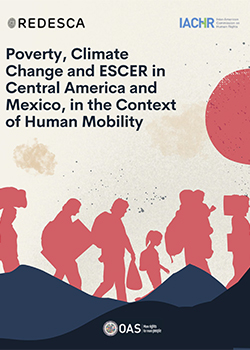- English
- Español
Press Release
REDESCA publishes thematic report "Poverty, Climate Change and ESCER in Central America and Mexico, in the Context of Human Mobility"
August 28, 2023
Contact info
Special Rapporteurship on Economic, Social, Cultural, and Environmental Rights
Distribution List
Washington, D.C. – The Office of the Special Rapporteur on Economic, Social, Cultural and Environmental Rights (REDESCA) of the Inter-American Commission on Human Rights (IACHR) publishes the thematic report "Poverty, Climate Change and ESCER in Central America and Mexico, in the Context of Human Mobility". This report addresses how poverty, inequality, the impacts of the climate emergency and limitations in access to and enjoyment of economic, social, cultural, and environmental rights (ESCER) have affected migratory movements in Central America and Mexico.
In this context, drawing from a comprehensive analysis of the root causes of extensive mobility while prioritizing Economic, Social, Cultural, and Environmental Rights (ESCER) – encompassing poverty, the right to development, and the ramifications of climate change – the report firstly delineates and consolidates the primary challenges confronting individuals in securing these rights within Central American countries and Mexico. Secondly, it outlines the distinct responsibilities of states concerning ESCER, with a special emphasis on individuals experiencing human mobility.
The thematic report is structured in six chapters: chapter I contains the background, purpose, structure, and methodology of the report. Chapter II identifies and systematizes the main challenges faced by people in Central America and Mexico in the face of guaranteeing their ESCER, while Chapter III analyzes the applicable standards in the face of poverty and inequality, as well as their impact on the phenomenon of human mobility in the subregion. For its part, Chapter IV develops the role of the climate emergency in this context and Chapter V identifies in detail the specific obligations of States in ESCER, with a particular focus on people who are in a situation of human mobility. In this context, some good practices identified in Central America and Mexico are noted, together with the imperative need for international cooperation mechanisms and integration policies in order to guarantee the human rights, and particularly ESCER, of persons in situations of human mobility in the subregion. Finally, Chapter VI presents the conclusions and recommendations to the States of the subregion, as well as to other States of the Americas and relevant actors, on the understanding that attention to this situation from a human rights perspective requires international cooperation and solidarity.
The Special Rapporteur expressed his deepest gratitude to the IACHR and the REDESCA team for their support, as well as to all the individuals and institutions that have contributed to its elaboration, in particular, for the valuable financial support of the Norwegian Cooperation.
REDESCA is an autonomous office of the IACHR that was specifically created to support the IACHR in fulfilling its mandate to promote and protect economic, social, cultural, and environmental rights in the Americas.
A principal, autonomous body of the Organization of American States (OAS), the IACHR derives its mandate from the OAS Charter and the American Convention on Human Rights. The Inter-American Commission has a mandate to promote respect for and to defend human rights in the region and acts as a consultative body to the OAS in this area. The Commission is composed of seven independent members who are elected in an individual capacity by the OAS General Assembly and who do not represent their countries of origin or residence.
No. RD199/23
5:20 PM



